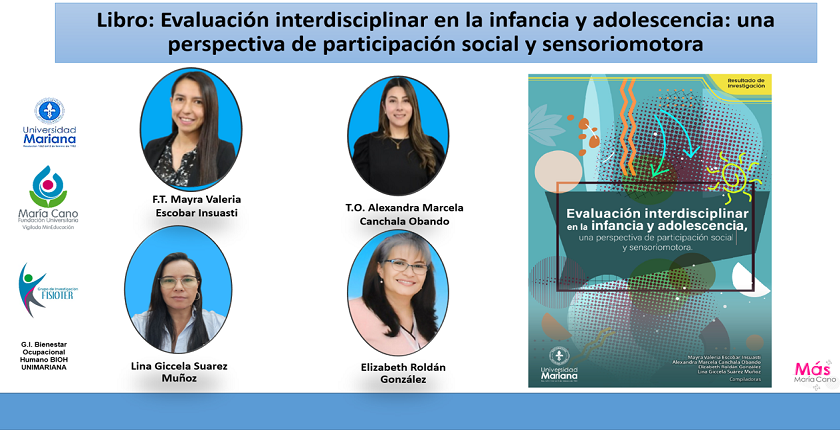Blog
Childhood, context, and well-being: contributions from FISIOTER
- 24 septiembre, 2025

Achievements of researchers from the FISIOTER Group at Fundación Universitaria María Cano, Medellín and Popayán campuses, featured in the book Interdisciplinary Assessment in Childhood and Adolescence: A Perspective on Social and Sensorimotor Participation
The FISIOTER Group at Fundación Universitaria María Cano celebrates the publication of the book Interdisciplinary Assessment in Childhood and Adolescence: A Perspective on Social and Sensorimotor Participation, published by Editorial UNIMAR. This work brings together valuable research focused on the psychosocial, environmental, and sensorimotor factors that influence the activity and participation of children and adolescents. Advocating for an interdisciplinary approach from the fields of physiotherapy, occupational therapy, and social sciences, this book is a key contribution to the study of the comprehensive development of this population.
Structured into five chapters, the book analyzes how family, school, and community conditions influence children’s social participation and well-being. It addresses psychosocial factors such as the family, socioeconomic, and educational environment, as well as environmental variables affecting children with neurodevelopmental disorders—highlighting the need for inclusive environments. Professors Elizabeth Roldán González and Lina Gicela Suárez Muñoz, from the FISIOTER Group, contribute key chapters: in the first, alongside Wendy Carolina Londoño Agudelo, they examine the relationship between the family context and social participation; and in the second, together with Isabela Uribe Amariles, they analyze the association between the CASP scale and psychosocial factors in Medellín. Professors Mayra Valeria Escobar Insuasti and Alexandra Marcela Canchala Obando, from Universidad Mariana and the BIOH Group, also participated.
The text offers both theoretical and empirical evidence. It not only contributes to the academic knowledge of programs such as Physiotherapy and Occupational Therapy but also serves as a reference tool for health professionals, educators, and families interested in promoting well-being, improving quality of life, and enhancing the levels of activity and participation of children and adolescents in Colombia. The book highlights the interaction between individual, family, and contextual conditions and their implications for the social inclusion and quality of life of minors.
The book is available for online consultation at the following link: DOI.
Fundación Universitaria María Cano remains committed to contributing to interdisciplinary knowledge and to the well-being of children and adolescents in our community.
